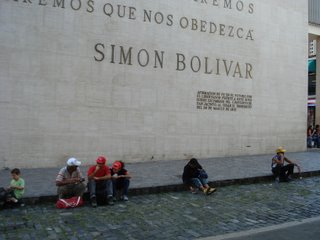Blogging in Caracas: Day 2

Blogging from Caracas.
Today, the delegation waded deep into the information stream, hearing from experts on the related issues of Venezuela’s economy, the upcoming election, and the structure of public opinion.
Economists often quarrel over competing pieces of data and different interpretations of what the data mean. While some are positive about Venezuela’s future, today we heard from economists with a pessimistic perspective of Venezuela’s economic prospects.
First, the good news: With oil prices at record levels, Chavez has the financial capacity to run social missions that provide essential services to the poor (e.g. literacy training, health care, and new business and job creation based on experimental enterprises). Chavez can claim some economic success and can point to eleven quarters of economic growth since the trough of the Venezuelan downturn in 2003. The political ramifications are obvious; the poor see themselves as being recognized by the government for the first time in the nation’s memory and they support Chavez accordingly.
Venezuela is a relatively wealthy country, but it suffers from the “resource curse.” Oil production does not create a diversified economy, nor does it create a lot of jobs. Income inequality has not seemed to budge over the last eight years. The president’s political opponents use growth figures dating from 1998 to the present to make their case of virtual economic stagnation, and to say that nothing has really changed.
Venezuela’s public sector has grown in ways that some economists believe are unsustainable. Add the public budget to the use of certain monetary resources from the central bank and they say the government is consuming nearly half of the nation’s $150 billion GDP on public expenditures. That can work when oil sells at a global market price of over $70 per bbl when Venezuela’s production costs are at $6 per barrel. But those conditions may not prevail over the long term.
****
Opposition groups fear that Chavez is consolidating his power politically, but they also are frank to say that this consolidation is taking place within the context of an open society – a country with a boisterous press, opposition political parties, not a police state.
The nation’s major electoral monitor believes that voter registries for the national election are capable of sustaining an honest election. The questions then turn to whether there is a unified opposition that is willing to participate (political parties abstained in recent parliamentary elections in an unsuccessful gambit to discredit Chavez) and whether they have a substantive and political program that breaks with the past and offers Venezuelans a real alternative.
Experts told us that the 2006 presidential election could be competitive. Voters are critical of the Chavez government in several key areas: they are insecure when it comes to crime; they are dissatisfied with the performance of the economy in terms of job creation; they have problems with the delivery of government services which, they say, are hampered by corruption; and they oppose Chavez using Venezuelan resources to win friends and influence governments abroad.
And yet, Chavez has earned a form of electoral impunity. Strong segments of the Venezuelan electorate like Chavez. They say he helps the country, helps the poor, has acted to create social missions that deliver needed services, and that he communicates honestly. When government is blamed for failures – too much crime, inflation, lack of jobs, and the like – it is everyone who is blamed but not Chavez specifically.
Opposition must participate. It must break with past practices. It must develop a positive program and a future-oriented identity. People want order, they want unity, they want equal opportunity, and they want the government to be efficient. A new political leader without ties to the past must emerge in order to make the presidential race in 2006 competitive.
We have more investigations to do. Please continue to read on with us and send us your comments.

0 Comments:
Post a Comment
<< Home